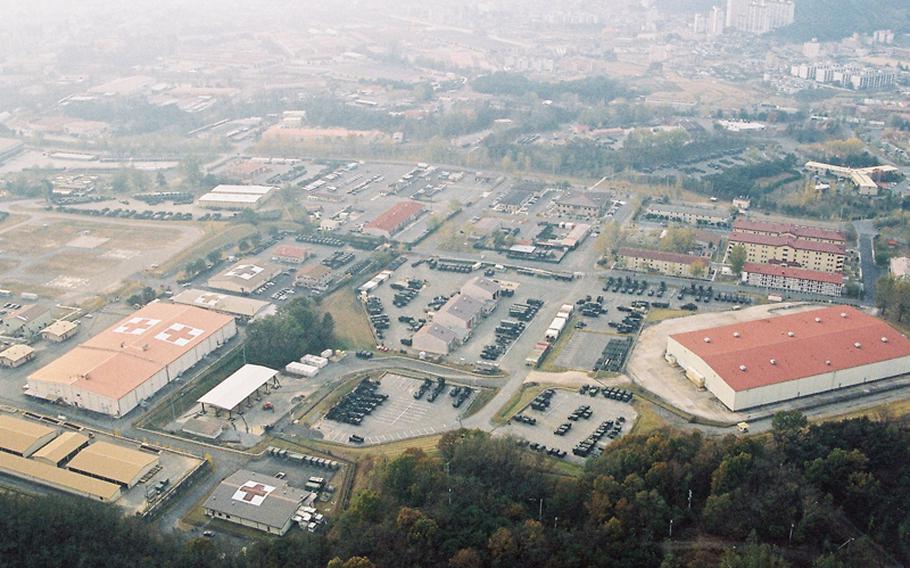
The Army's Camp Carroll in South Korea, shown in a 2009 aerial photo. (Courtesy of the U.S. Army)
SEOUL — Sparked by a posting made seven years ago on a veterans’ website, South Korea on Wednesday began investigating the possible burial of chemicals at a former U.S. base nearly five decades ago, according to an official from the prime minister’s office.
A former soldier stationed at Camp Mercer posted a comment in May 2004 on the Korean War Project website that said the U.S. buried hundreds of gallons of chemicals at Camp Mercer — a small installation in Bucheon that was turned over to South Korea in the 1990s — while he was stationed there in 1963 and 1964.
“We dug a pit with a bulldozer, donned rubber suits and gas masks and dump every imaginable chemical — hundreds of gallons if not more — into the ground on a knoll behind the second storage warehouse on the right,” retired Master Sgt. Ray Bows wrote.
Bows’ comments attracted widespread attention in South Korean media this week following recent allegations that the U.S. buried the defoliant Agent Orange at another base, Camp Carroll, in 1978.
Three U.S. veterans told a Phoenix television station that they helped bury large amounts of the chemical in a ditch there and continue to suffer health problems from their exposure to it.
The 8th Army said this week that a large number of drums containing pesticides, herbicides and solvents were buried at Carroll in 1978 but were removed the following two years, along with 40 to 60 tons of soil. Officials say they do not know if Agent Orange was among those chemicals.
The military found trace amounts of dioxin, a component of Agent Orange, in 2004 in one of 13 test holes bored at the site, but determined that the amount was too small to be a health threat. Officials had not answered a query from Stars and Stripes as of Wednesday night asking what had prompted that testing.
About seven South Korean officials toured former Camp Mercer, now home to a South Korean engineering unit, on Wednesday to familiarize themselves with the former base, according to a Ministry of National Defense official who said the inquiry had not yet reached the level of an official investigation. He said U.S. military officials did not participate in the tour.
Jeff Buczkowski, 8th Army spokesman, said Wednesday in an email that commenting on Bows’ statement would be “pure speculation.”
“8th Army is focused on the allegations of Agent Orange buried on Camp Carroll,” he said. “Other actions may be addressed through the SOFA Environmental Subcommittee.”
Both the prime minister’s office and the Ministry of National Defense said Wednesday that they had not interviewed Bows and did not know how to reach him.
The alleged burial of Agent Orange has been one of the top news stories in South Korea, and several small protests have been held outside Camp Carroll and the U.S. Embassy in Seoul in the past week.
Lee Jae-hyuk, head of the Daegu branch of the environmental activist organization Green Korea United, said there is growing anger among South Koreans who believe U.S. Forces Korea has not acted swiftly or transparently enough to resolve the question of whether Agent Orange is buried at Camp Carroll.
He said millions of South Koreans are worried that they are drinking contaminated water from the Nakdong River, located near Carroll, and he believes the U.S. government owes South Koreans an apology.